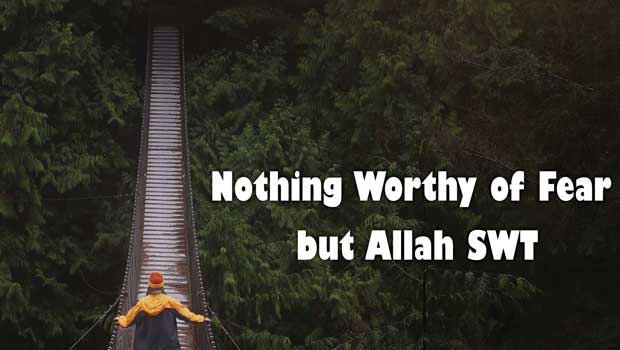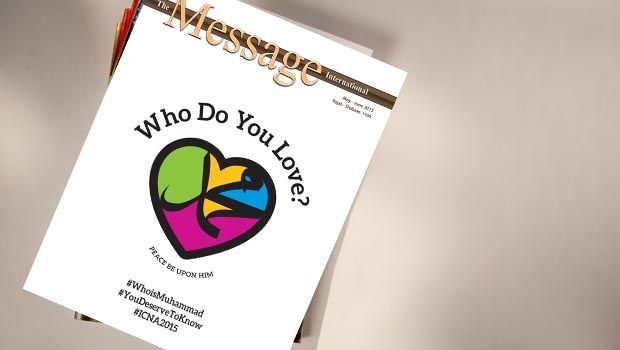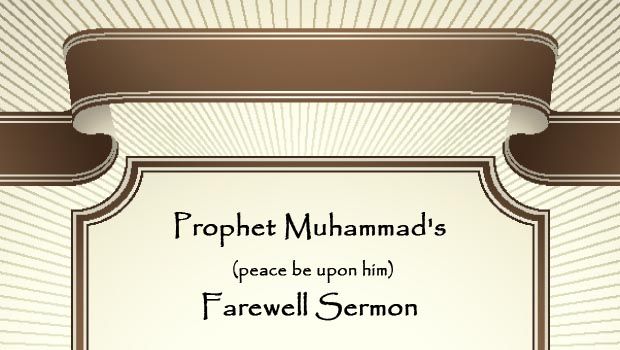Fear is a very interesting emotion — it can motivate or it can paralyze. It can be productive or it can be destructive, depending on who you fear, why you fear, and what you fear. Fear is either praised in the Quran or it is looked down upon when it becomes paralyzing and destructive and leads you to nowhere but despair. Unless you have hope to bring balance, there’s no way that fear could possibly be productive because it is so often a paralyzing emotion. It needs hope in order for it to be productive.
Courage and Composure
If there were to be an attack on a city, what usually happens to the most important people that reside in that city? Where do they go? What do they do? They take refuge in safe, secured locations. When a head of state is present and an attack unfolds, typically speaking, the head of the state will be locked down under maximum security, and those who are already most vulnerable, the people, and especially the poorest people, will be at greatest risk. The most powerful and those deemed most important are hid away, often by their own commands. But now, consider a hadith narrated by Anas ibn Malek (RAA) that describes the quality of fearlessness of the Prophet (pbuh). The Prophet is described as the best of people, the most perfect of people, the most generous, and the most courageous. And Anas ibn Malek recalled an incident that took place where there was some noise outside in the middle of the night in Madinah, and the people thought they were under attack. So, when Madinah is under attack where do you think the Prophet (pbuh) should go? What do you think the protocol should be? Wouldn’t most people expect that everyone would surround the house of the Prophet and make sure that he’s protected?
Yet, Anas ibn Malek says, “And we came out and we see the Prophet (pbuh) riding on his horse, unstrapped to it.” The Prophet (pbuh) is on his horse and has his sword in his hand and is riding around to make sure that any attack would be deterred. And the Prophet says to the people who had gathered, ”Do not be afraid, do not be afraid.” Ali (RAA) said that when a battle would become toughest, when it would become hardest, and when they would be utterly exhausted, the people would be behind the Prophet (pbuh) in battle. He was the nearest to the enemy. Al-Baraa said that the bravest of them would only be standing next to him. This was the Prophet (pbuh) — such courage and such composure in the face of things that would typically cause people absolute fear.
Nothing Worthy of Fear but Allah SWT
There are various things that humans fear. Some people fear death and might find it radical to be told that they shouldn’t fear the end of life. Of course, one can quote Socrates or Plato on the unwisdom of fearing death, or a more contemporary figure like Dr. Martin Luther King, Jr. who referenced the willingness to die for some good, rather than fearing death: “If you haven’t found something worth dying for, you aren’t fit to be living.” When the Prophet said that the nations will gather against the Muslims and feast on them as at a table, and fear would be placed in their hearts, the companions asked what that fear was. The Prophet told them the fear is loving the world too much and hating death too much. There needs to be something that gives you absolute resolve in the face of things that normally cause people to fear. That is what eman is. And so, the Prophet (pbuh) didn’t fear the snares of the people or their stares or their smears. What was it about the Prophet that when a man, an enemy with sword in hand, stands above him and says, “O Mohammed, who will stop me from killing you?” — that the Prophet, with full composure and tranquility, can say, “Allah.” This is complete trust in Allah, that nothing was worthy of fear but Allah, and that no consequence that would be faced for His sake, is to be feared either. What’s the worst that they could do to you when you’re living for Allah SWT? If they slander you, then Allah will glorify you and raise you. If they kill you, it’s martyrdom. That’s the fearlessness that was in the voice, the unquivering voice of Ibn Taymiyyah (RAA) when he said, “What can my enemies do to me? My Paradise is in my heart; it goes with me wherever I am. If they kill me, it is martyrdom. If they exile me from my land, it is a journey in the Path of Allah. If they imprison me, it is to allow me a chance to be in seclusion with Allah.”
There’s no fear because there’s nothing worth fearing except Him, and there’s no consequence worth fearing if it is faced because of your determination to do what He commands you to do. And the Prophet (pbuh) taught us many lessons in this regard. In fact, when a person overcomes some difficulty in his or her life, then they’re able to conceive of how they would deal with a difficulty of an even greater magnitude. Consider the dignity and courage of our modern-day Muslim heroes, like Malcolm X, who said that he never did or said anything except that he expected the most difficult of circumstances in consequence of it. Mohammed Ali, may Allah have mercy on him, was the most outspoken and blunt for the sake of Allah and for the truth. His apartment on the South Side of Chicago was set on fire the day that Malcom was assassinated. These adversities caused him to grow in his faith and determination. These individuals, rather than fearing what might befall them, had an inner stability and always remembered the One from Whom they came and to Whom they would return, and what their purpose was in this world. And they knew, with fierce conviction, the One who truly protects the believer, and from whom rewards and honor come. What then can anyone do to the believer?
The Fearlessness of the Prophet (pbuh)
In the Battle of Uhud, the Prophet (pbuh) was almost killed and he was carried behind the mountain. One of the enemy, Abu Sufiyan, called out, “We have our idols and honor and you have no honor.” The Prophet (pbuh) didn’t tell Omar (RAA) to respond by insulting their idols. These, to the believers, were insignificant. Omar responded, saying, “Allah is our protector, and you have no protector.” He referred the exchange back to Allah because if you have Allah then nothing else matters. Then no one can frighten or scare you; then no one can intimidate you, because you realize that all dignity, honor, and protection come from Him SWT.
If there were any moment that would send shivers down your spine, it would be a time like when Prophet Muhammad (pbuh) and Abu Bakr (RAA) were hiding in a cave after escaping from the Quraysh in Makkah. Their pursuers were just a few feet away, with their swords ready to kill. They had already seen so many of the believers killed, and they had already seen the torture of Ammar, Somaiya, Khabbab, and others. When Abu baker (RAA) started to fear, not for himself, but for the Prophet, the Prophet said to him with full composure, “Don’t be afraid, Allah is with us.” A verse in the Quran about them hiding in the cave tells us, “Then Allah sent down His calmness upon him, and strengthened him with forces which you saw not, and made the word of those who disbelieved the lowermost, while it was the Word of Allah that became the uppermost, and Allah is All-Mighty, All-Wise” (9:40). When you have that composure, as you look around you, and so many things are meant to intimidate you, so many things are is meant to threaten you, so many things are meant to shock you, but in the inside, you’re growing in that trust in God to where it doesn’t even faze you anymore.
Building Trust in Allah SWT
I’m not going to pretend like I have no fears, and I’m not going to suggest that any one of us has attained the courage of the Prophet (pbuh) or that we will ever attain the courage of the Prophet. But I will suggest that the Prophet’s courage always circulated around the singular concept of tawheed, experiencing monotheism in the heart and settling the heart with Allah. Yes, believers have a radical fear of Allah and a radical fearlessness of those who try to intimidate us because of our belief in Allah. Allah knows that we have enough courageous examples from the lives of the Prophet and his companions, and the righteous in our own lifetimes, that we’re able to propel through the most difficult of circumstances.
Whatever we see happening around us, the militarism, Islamophobia, xenophobia, and the crassness and dishonesty of politicians, all that can unsettle and frighten people. The greatest way to protect ourselves is to build the trust in Allah SWT by centering Him in our lives during the times that are not frightening so that we’ll have Him in times that are frightening. And that’s what the Prophet (pbuh) taught us: “Be mindful of Allah, and you will find him in front of you. Know Allah during times of prosperity and He will know you in times of adversity.” That’s not just referring to your financial and material situation. Be with Allah in times when you’re not afraid, and Allah will know and be with you in times that you are afraid. Center Allah in your life, and as a community we need to center Allah SWT again and again in our discourse. And we need to remind ourselves that Allah is our protector, and whatever we encounter, there is no protector but Him.
Community
Nothing Worthy of Fear but Allah SWT






